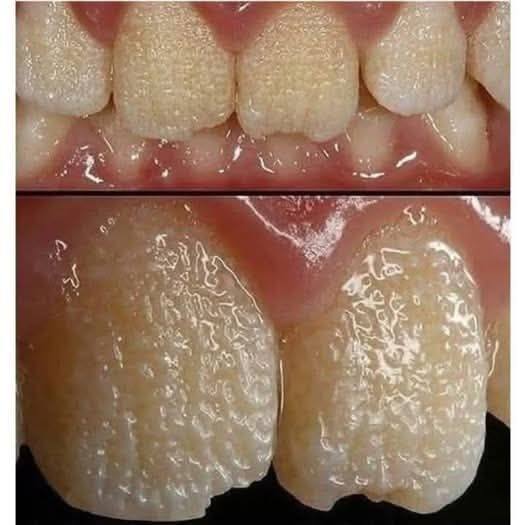Amelogenesis Imperfecta: The Hidden Reason Why Some Teeth Are More Fragile Than Others…
Have you ever noticed that your teeth look a little different — maybe more yellow, more translucent, or more prone to sensitivity — no matter how carefully you brush or what toothpaste you use?
If so, what you’re noticing might not be about hygiene at all. It could be something deeper — something written in your genes.
This condition is known as Amelogenesis Imperfecta (AI) — a rare hereditary disorder that affects how the enamel (the outermost layer of your teeth) forms.
And while it sounds complicated, understanding it can help you take better care of your teeth — and maybe even avoid years of unnecessary frustration.
1. What Amelogenesis Imperfecta Really Is
To understand AI, it helps to know what enamel does.
Enamel is the hard, white protective layer that shields your teeth from temperature changes, chewing pressure, and bacteria.
In people with AI, the genes responsible for forming enamel don’t work as they should. The result? Enamel that’s thin, soft, discolored, or in some cases, missing in places altogether.
That means teeth with AI don’t have the same strength or resilience as normal teeth — making them more sensitive, more vulnerable to decay, and often, visibly different in color or texture.
Some people describe it as if their enamel “didn’t finish building.”
2. What It Looks Like (And Why It Varies So Much)
Amelogenesis Imperfecta doesn’t look the same for everyone. There are actually several types, each with its own pattern of enamel defects:
Hypoplastic type: Enamel is thinner than normal. Teeth may appear small or pitted.
Hypomaturation type: Enamel forms but doesn’t harden properly, leaving teeth soft and slightly opaque.
Hypocalcified type: Enamel forms in normal thickness but is weak and chalky, making it prone to breaking or wearing away.
In mild cases, it may just look like slight discoloration — teeth that are more yellow, brown, or even grayish-white than usual. In severe cases, enamel can wear down rapidly, exposing the inner dentin and causing extreme sensitivity.
The condition can affect baby teeth, permanent teeth, or both.

3. Why Sensitivity Is Such a Big Issue
When enamel isn’t doing its job properly, everything that touches your teeth — heat, cold, sugar, even brushing — can feel painful.
That’s because the underlying dentin layer is exposed. Dentin contains microscopic tubules that connect to the nerve of each tooth, meaning any temperature change or pressure travels straight to the nerves.
People with AI often describe it as a sharp, electric pain when they drink cold water or bite into something hot.
And since weak enamel also allows bacteria to enter more easily, cavities can form much faster — even with good oral hygiene.
4. How It Affects Confidence and Quality of Life
AI isn’t just a medical condition — it can affect how people feel about their smile.
Children and adults with AI often deal with visible discoloration or uneven surfaces on their teeth, which can lead to self-consciousness. Some avoid smiling altogether or feel anxious in social settings.
That’s why emotional support and education are just as important as medical treatment. Understanding that this isn’t a “hygiene problem” but a genetic condition helps reduce the stigma and builds confidence in seeking the right care.
5. What You Can Do: Managing AI the Smart Way
While there’s currently no way to “cure” AI, there are effective ways to manage it and protect your teeth long-term. The key is early diagnosis and personalized dental care.
Here’s what most dental experts recommend:
- Regular Dental Checkups
- Early detection helps prevent enamel loss and decay from progressing. A dentist can identify AI by examining tooth appearance, family history, and X-rays.
- Protective Restorations
- Depending on severity, your dentist may suggest treatments like:
- Resin or composite bonding to protect weak enamel and improve appearance
- Crowns for severe wear or sensitivity
- Fluoride treatments to strengthen what enamel remains
- Sensitivity Management
- Using desensitizing toothpaste and avoiding extreme temperatures (very hot or cold drinks) can reduce discomfort.
- Avoid Harsh Whitening Products
Many people with AI try whitening treatments to correct discoloration, but these can worsen sensitivity. Always consult your dentist before trying any cosmetic procedure.
Nutrition and Daily Care
A balanced diet with limited acidic or sugary foods helps prevent erosion. Gentle brushing with a soft-bristled toothbrush is also crucial to avoid damaging the enamel further.
6. How Dentists Diagnose It
Diagnosis is often made through a combination of:
- Visual examination — looking for characteristic color or shape differences
- Dental X-rays — to assess enamel thickness
- Family history — since AI often runs in families
- Genetic testing — in some cases, to identify specific gene mutations
If your dentist suspects AI, you may be referred to a specialist such as a prosthodontist (who focuses on tooth restoration) or genetic counselor for further evaluation.
7. The Most Important Thing to Know
Having AI doesn’t mean you can’t have a healthy, beautiful smile.
But it does mean you need to understand your teeth differently — not as “weak” or “bad,” but as unique and in need of specific care.
Early diagnosis and a tailored dental plan can prevent years of pain, frustration, and unnecessary cosmetic procedures that don’t address the root cause.
If you’ve always struggled with unexplained sensitivity or discoloration — even after good hygiene — it might be worth asking your dentist about Amelogenesis Imperfecta.
Because sometimes, the answer isn’t about brushing better — it’s about knowing what your body is telling you.
Quick Takeaway
Amelogenesis Imperfecta (AI) is a rare genetic condition affecting tooth enamel. It can cause discoloration, sensitivity, and faster enamel wear. It’s not caused by poor hygiene but by a genetic mutation. With early diagnosis and proper dental care, symptoms can be managed effectively. The sooner you know, the better your long-term dental health — and confidence — will be.